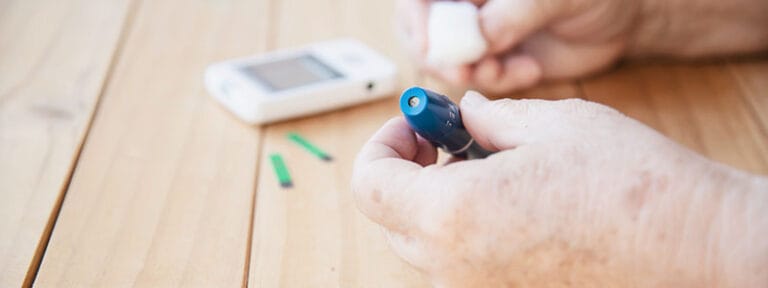Does Smoking Really Cause Diabetes or Just Worsen It?


Written By: Aman Doda
Last Updated: 08/07/2025


You already know smoking is bad… but can it actually trigger diabetes — or just make it harder to control? Let’s clear the confusion.
- The hidden link between smoking and common vision problems like cataracts, glaucoma, and macular degeneration
- How nicotine affects the delicate blood vessels and nerves in your eyes
- Real science made simple: how smoking reduces oxygen supply to your retina
- What early symptoms to look out for—and why many men ignore them
- A powerful story of Mr. Arun Thomas, who smoked for 50 years and now lives smoke-free while managing glaucoma
- The good news: how quitting—even now—can slow or stop further vision loss
- Why your eyes might be the most urgent reason to quit today
If you ask the average smoker:
“Does smoking cause diabetes?”
Most will say:
“No yaar, it might make things worse, but it doesn’t cause it.”
And you can’t blame them.
Diabetes is often linked with:
- Sugar
- Family history
- Obesity
- Stress
- Sedentary lifestyle
Smoking or Gutka rarely make it to the top of that list.
But that’s exactly where the misunderstanding begins.
Because science now says something very different.
What’s Actually Happening Inside the Body
Let’s break it down simply.
To understand how diabetes works, you first need to understand insulin.
Insulin is a hormone your body makes — its job is to help glucose (sugar) move from your blood into your cells, where it’s used for energy.
Now, here’s where smoking comes in.
Every time you light up a cigarette (or chew tobacco), this is what happens:
1. Nicotine Triggers Insulin Resistance
Nicotine messes with the way your body responds to insulin.
Imagine your cells have a lock… and insulin is the key.
In a healthy system — the key fits, sugar goes in.
But nicotine changes the lock.
So now even though insulin is knocking, the door doesn’t open.
This is insulin resistance — the key driver of Type 2 Diabetes.
Over time, your pancreas gets tired of producing more and more insulin to compensate. Eventually, it can’t keep up — and blood sugar starts to rise.
2. It Raises Cortisol — The Stress Hormone
Smoking creates an internal stress response.
Your body goes into alert mode:
Heart rate up.
Blood pressure up.
Cortisol up.
And cortisol? It spikes your blood sugar.
Even if you’re sitting in one place doing nothing, your body behaves like it’s in a survival situation — pushing more glucose into the bloodstream.


3. It Damages Blood Vessels and Tissues
Over time, nicotine shrinks your blood vessels, slows healing, and increases inflammation.
This:
- Damages insulin receptors
- Reduces nutrient absorption
- Slows down your body’s ability to use glucose efficiently
So even if you’re trying to control your diet, do some walking, or take your meds — nicotine silently keeps reversing the work.
What Science Says (Not Just Opinion)
Let’s look at what real research shows:
📊 WHO (World Health Organization) has clearly stated:
“Smoking is a direct and independent risk factor for Type 2 Diabetes.”
🧬 NIDA (National Institute on Drug Abuse) adds that nicotine alters how your body regulates blood sugar, increasing the likelihood of insulin resistance and metabolic syndrome.
🧪 And according to ICMR, smokers are:
- 30–40% more likely to develop diabetes
- 2x more likely to face complications like neuropathy, foot ulcers, and kidney issues
So no, it’s not just worsening your condition.
Smoking is now officially recognized as a cause of diabetes.
A Real-Life Story: “I Thought My Sugar Was Due to Family History…”
Meet Ravish, 35 years old, smoked for over 20 years.
Had a minor stroke, borderline sugar, BP issues — all “manageable.”
“I thought my sugar was just from stress and genes. Nobody ever told me smoking could be the actual trigger.”
When he joined the QSFS program, he didn’t just quit smoking.
His sugar stabilized. His energy came back. He could finally speak and present again without shortness of breath or mental fog.
Watch his story:
“I was fixing everything — diet, sleep, meds — except the one thing that was silently ruining it all: cigarettes.”
Why This Awareness Matters
When people hear “diabetes,” they think it’s about food.
But your body’s sugar balance isn’t just about sugar intake.
It’s about how your body processes and responds to sugar.
And nicotine attacks that exact system.
So even if you’re eating well, walking, taking medicine…
If you’re still smoking or chewing Gutka, you’re working against yourself every day.
That creates frustration:
“I’m doing everything right. Why am I not getting better?”
This blog is your answer.
What Happens If You Quit (And Why It’s Not Too Late)
Let’s be real. Quitting doesn’t reverse everything instantly.
But within a few weeks to months, here’s what starts changing:
- Insulin sensitivity improves
- Sugar spikes reduce
- Cortisol levels settle
- You feel less tired
- Medications work more effectively
You stop the long-term damage before it becomes irreversible
And most importantly —
You feel like your efforts are finally making a difference.
That internal friction goes away.
You stop feeling like you’re always fighting your body.
Take the First Step Today
If you’ve been smoking or chewing Gutka — and you’ve got sugar issues (or a strong family history)…
Then this isn’t just about quitting.
This is about protecting your future self.
👉 Join my Free Masterclass where I’ll explain how the Quit Smoking Freedom System (QSFS) helps people like you break free — without pressure, without relapse, and without going through it alone.
- Get clarity
- Understand your mind and biology
- Learn a system built for Indian adults, age 35+
“You can’t fix a system that’s still being poisoned every day.
The real recovery begins the day nicotine ends.”
We’re here when you’re ready.
Let’s fix the root cause — not just manage symptoms.
Disclaimer
This article is for educational and awareness purposes only. While it is written by a wellness coach with expertise in nicotine addiction and smoking cessation, it is not a substitute for professional medical advice, diagnosis, or treatment.
If you are experiencing vision problems or have been diagnosed with an eye condition, please consult a licensed ophthalmologist or healthcare professional. Every individual’s health journey is unique, and medical decisions should be made in consultation with qualified experts.
Share via:
